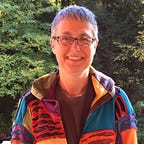Acceptability is fluid…
What you’ve identified, Ben, is indeed a part of what Dark Allies wants to achieve: not defining binaries, but establishing a pluralingual space held together by a shared focus on a dynamic juxtaposition between intersectionality and permaculture.
Intersectionality has two aspects: the simultaneous presence of multiple identities composing each person, and the ways in which institutions and social systems privilege one identity to the exclusion of others.
Permaculture is also manifold: my favorite definition is “perennial agriculture for human settlement,” because these terms include all the necessary reference points, i.e., food (forever, hehe) and people in (a) place.
On top of the essential knowledge about sustainable and resilient practices of food production in keeping with planetary limits, what’s interesting about the ‘permaculture movement’ is its appeal to white people. Because permaculture by definition includes the social, I have a hypothesis that permies may be more inclined or somehow more open to unlearning the aspects of whiteness that contribute detrimentally to society by resisting or ignoring intersectionality.
Practically, this means Joel Salatin can believe and represent himself however he wants (and is privileged to be able to), but ought to be cognizant and responsible for the (hitherto probably) unconscious and/or unintended effects of a unilateral presentation. Can he and others in the permaculture movement learn to be intersectional?
I’m optimistic.
We’re pursuing that hope over at Dark Allies.
